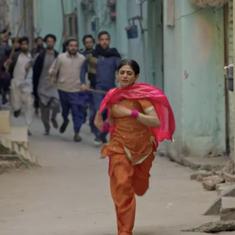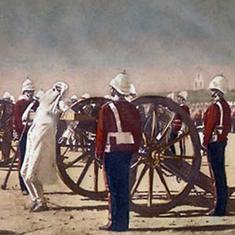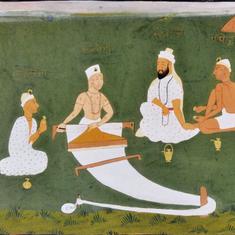Democracy good, Communism bad? In Wolfgang Becker’s Good Bye Lenin!, the answer is a bit more complicated.
The 2003 German production is both a heart-tugging and hilarious family drama about a son’s dedication to his ailing mother and an astute deconstruction of the dynamics of nostalgia. Its central event occurs in 1989, a month before the collapse of the Wall that had divided the city of Berlin and separated East Germany from its Western sibling for 29 years. School teacher Christiane (Katrin Sass) is an ardent believer in Communism. Her son, Alex (Daniel Bruhl), has happily grown up under an authoritarian regime that controlled television habits, the food stocked in grocery stores, and the size of the apartments available to residents.
But he is not blind to the changes sweeping through their world. Unlike Christiane, whose eyes are literally and metaphorically clouded by the giant red banner that covers her window during a massive public celebration of yet another socialist milestone, Alex knows that the Wall, and everything it stands for, will soon be reduced to rubble.
Alex participates in an anti-government demonstration, and his mother has the misfortune of seeing her son being beaten to the ground by the police. Christiane slips into an eight-month-long coma, and one of the greatest events in history passes her by. In a nice Hindi movie touch, the doctors warn Alex that Christiane has a weak heart and cannot endure any more shocks.
Christiane had been previously hospitalised after her husband abandoned the family. After a nervous breakdown, she came back home and gathered herself by destroying all material traces of her husband’s memory. In a movie that is well stocked-up in its semiotics lessons, Christiane throws away her husband’s ties in a sack with the words “In solidarity with Mozambique” written on it.

By the time Christiane emerges from her coma, reunification has transformed Berlin. How is Alex to break the news to his beloved mama that East Germany no longer exists, and that everything she holds dear has vanished – her favourite brand of gherkins, the didactic news programmes, the socialist community spirit?
How is he to hide the new red banners in town, which belong to Coca-Cola and not to the Soviet Union? How is his sister Ariane (Maria Simon) to tell her mother that she has abandoned her economic theory course for a job that studies the actual power of money (she works at the newly opened Burger King)?
The time machine that Alex builds along with Ariane, his girlfriend Lara (Chulpan Khamatova) and his friend Denis (Florian Lukas) will have immense resonance for Indians who witnessed the massive economic changes that took place in the country in the early 1990s. Alex starts meticulously recreating the world that evaporated with the fall of the Wall.
The wallpaper, radio set, and old-style television are reinstalled in Christiane’s bedroom. Alex rummages in the trash for bottles of the old brand of gherkins, prompting a neighbour who misses the old days to comment, “This is how far they have driven us, we have to now fish in the garbage.”

Denis, an aspiring filmmaker who dreams of being the Stanley Kubrick of reunited Germany, even puts on a fake moustache and creates fake news broadcasts that assure Christiane that East Germany continues to be the most advanced nation on the planet.
Alex occasionally overplays his hand. He commissions a spurious news bulletin to justify the Coca-Cola banner that looms outside the window, and Denis declares that East Germany invented the cola drink.
Christiane is mildly suspicious. “Is Coca Cola a socialist drink?”
“See how the West has ripped us off all these years!” Alex replies.

Alex even manages to put a spin to the moment when Christiane steps out of the house for the first time and sees a giant Lenin bust being carried over the rooftops, presumably to a dumping ground somewhere. In the beautifully filmed sequence, the bust passes before Christiane’s dazed eyes, forcing Alex to come up with yet another on-the-spot rewrite of German history that is both funny and moving.
There is more than an antique shop quality to the former East Germany that Alex recreates. His endeavour to freeze the past in a pre-1989 mould has the support of some of Christiane’s comrades. One of them weeps in gratitude: “It is like living in the East.”
Alex and Ariane too have their nostalgia moment when they go to the bank to try and exchange old currency for new. In a scene that will be familiar to the hapless Indians who missed the demonetisation deadline, the siblings are thrown out of the bank. The old notes, like Christiane’s rigid beliefs, are as good as waste paper.

The movie doesn’t address the excesses of East German rule. The 2006 movie Das Leben Der Anderen (The Lives of Others) offers a less romanticised view of what it meant, especially for artists, to live under a brutal authoritarian regime. Instead, Good Bye Lenin! accommodates the yearning of East Germans to return to a way of life that had order, economic stability, equality, and the suggestion of individual dignity. “We were all valuable people,” one old codger remarks.
Wolfgang Becker and Bernd Lichtenberg’s screenplay gently and humourously suggest that while democracy and capitalism were inevitable and welcome developments, life in East Germany wasn’t all that terrible for many of its citizens.
Like the website Soviet Visuals, which lovingly revisits memories of life in Soviet Union by collecting propaganda slogans, film clips, songs, post-cards and memorabilia, the movie dreams up the kind of country that Alex would have liked to have grown up in. The Wall needed to go, but the memories can stay.











